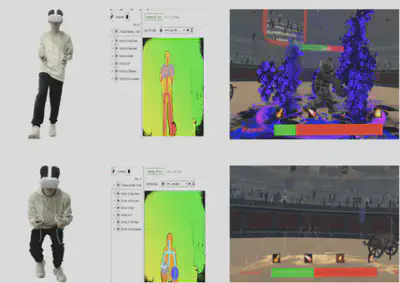Adaptive Audience(in submission for CHI PLAY 24,more details will released after publication)

In the virtual realms of reality, where digital landscapes blend seamlessly with human interaction, lies the frontier of our study: AdaptiveAudience, a groundbreaking system designed to enhance the player experience in virtual reality (VR) exergames. This study delves into the intricate dance of technology and emotion, exploring how an adaptable audience within these games can dynamically enhance gameplay and player engagement.
At the core of our exploration is the fascinating intersection of emotion and technology. As we venture into the realm of VR gaming, a domain where physical exertion intertwines with digital interaction, we encounter a unique opportunity: to transcend traditional gaming experiences by integrating emotional adaptability. The AdaptiveAudience system, a sophisticated amalgamation of technology and human insight, stands at the forefront of this endeavor.
This innovative system, designed with a keen understanding of player emotions, adjusts the behavior, sound, and scale of Non-Player Characters (NPCs) based on real-time monitoring of player emotions during gameplay. By harnessing the power of reinforcement learning algorithms, AdaptiveAudience ushers in a new era of gaming – one where the emotional state of the player is not just recognized but becomes a driving force in the gaming experience.

Our study is not just a technical investigation; it’s a narrative of human interaction, emotion, and technology. It embodies the quest to create a gaming experience that is not only immersive and engaging but also emotionally resonant. By focusing on three types of audiences – positive, neutral, and negative – and employing advanced algorithms, we aim to create a virtual world that responds and adapts to the player’s emotional landscape in real-time.
The implications of this study extend beyond the boundaries of VR exergames. It opens new horizons in understanding player engagement, emotional interaction, and the potential of adaptive technology in entertainment and beyond. In the following pages, we unfold the layers of this innovative study, exploring the depths of emotional adaptability in VR gaming and its transformative impact on player experience.